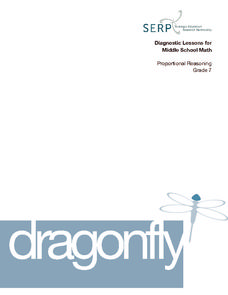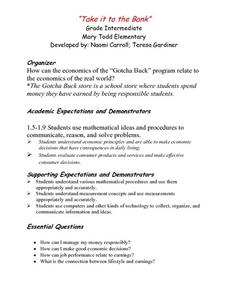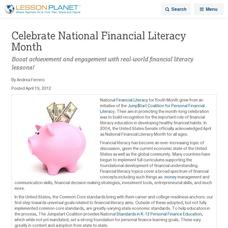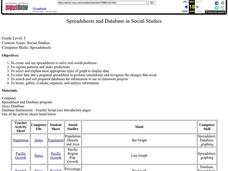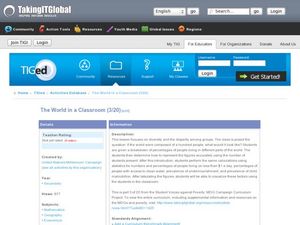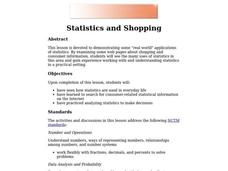NASA
Lights on the International Space Station
Groups explore illumination with NASA's Lighting Environment Test Facility (LETF) as a context. Using the TI-Nspire app, groups determine the lux equation that models their simulation. They then use the lux equation to solve problems...
Achieve
Ground Beef
Ever wonder how a butcher creates the different types of ground beef? Young mathematicians explore the methods butchers use to create their desired ground beef quality. Given a combination of two types of meat with varying leanness,...
Curated OER
Stock Swaps, Variation 3
More on the fictitious takeover of the Apple Corporation by Microsoft. In this scenario, Microsoft has $28.00 per share to spare, so how many do they need to offer to make an even trade? This is an engaging problem to solve when...
Curated OER
Dragonfly
The speed of a dragonfly brings math into the real world as your learners collaboratively see the value in calculating unit rates in direct proportion problems. This six-phase lesson encourages you, as the teacher, to only ask questions...
Curated OER
Take It To the Bank
Examine how the economics of a school store relate to real world economics. Elementary students explore various websites, complete a Venn diagram, create a schedule of wages for the students, read the book "A Chair For My Mother" and...
Curated OER
Celebrate National Financial Literacy Month
Boost achievement and engagement with real-world financial literacy lessons!
Illustrative Mathematics
Gifts from Grandma, Variation 3
There are three money word problems in this activity, each one is set in the same context. The first asks what was the total amount grandma spent, the second how many grandchildren grandma has, and the third asks how much grandma spent...
Lewiston High School
Weight and Mass & Forces in Equilibrium
I would weigh less on the moon? Send me there, then! On the top of the first page, a cartoon image demonstrates the difference between Earth and the moon. It then goes on to describe weight and mass and provides five practice problems...
Illustrative Mathematics
DVD Profits, Variation 1
The idea in the resource is to understand the connections between proportional relationships, lines, and linear equations. To stay within the context of the standard, skip the part of the resource that solves with unit rates. Instead,...
Illustrative Mathematics
Fishing Adventures 2
This resource is part of a series which expects participants to be familiar with graphing inequalities on a number line. It is a word problem that asks your class to graph a discrete solution set and interpret it in the context of an...
BioEd Online
Muscles and Bones in Space
Being an astronaut takes not only high mental acuity, but also a high level of physical fitness, especially for those who spend a long amount of time away from Earth, such as the astronauts serving on the International Space Station....
Curated OER
Does the Decimal Point Really Make a Difference?
Fourth graders study the decimal dilemma and discover major math mistakes in the real world with cheeseburgers advertised for .99 cents each or colas for .89 cents each.
Curated OER
Pythagorean Theorem
High schoolers explore the Pythagorean Theorem. In this math instructional activity, students apply the Pythagorean Theorem to real life situations. High schoolers find the hypotenuse and solve real world problems.
Curated OER
Spreadsheets and Database in Social Studies
Fifth graders create/use spreadsheets to solve real-world problems, explore patterns and make predictions, select/explain most appropriate types of graph to display data, and enter data into a prepared spreadsheet to perform calculations.
Curated OER
Euler Characteristic
Students identify the different properties of Euler's Characteristics. In this geometry lesson, students identify the shape and surface a polygon. They relate the concept of Euler to solving real world problems.
Curated OER
The World in a Classroom
Students calculate percentages of different kinds of people in the world. In this diversity lesson plan, students will see the percentages of different people and different incomes based on if the world only had 100 people in it.
Curated OER
Metric System
Students solve problems using the metric system. In this algebra lesson, students convert between the metric system and the Imperial system. They use these two systems to solve real life problems.
Curated OER
Writing Number Sentences
Learners practice writing number sentences. After reading real world problems, they describe the same situation by writing a number sentence. Students use algebra tiles, or counters, to demonstrate the use zero pairs in solving...
Curated OER
Introduction to Solving Quadratic Equations by Factoring
Students solve quadratic equations. In this algebra lesson, students factor and graph linear and quadratic functions. They identify the standard and linear form of each equation.
Curated OER
Statistics and Shopping
Explore how statistics are used in everyday life. Your soon-to-be savvy consumers use the Internet to find consumer-related statistical information and learn to make wise consumer decisions. Includes links to a practice sheet about data...
Curated OER
Worksheet #7
In this maximum and minimum of values worksheet, students solve 4 problems, two of which are word problems, related to determining values of a given variable. First, they find the maximum value of P subject to its constraints. Then,...
Radford University
Parallel Lines, Transversals, and Angles: What’s the Connection?
Streets, bridges, and intersections, oh my! Parallel lines and transversals are a present in the world around us. Learners begin by discovering the relationship of the angles formed by parallel lines and a transversal. They then apply...
Curated OER
Ratios And Scale
students investigate the concept of using a ratio in the work of construction and solve problems using real life applications. They read descriptions of how various types of construction professionals use ratios on the job. The lesson...
Utah Education Network (UEN)
Mathematics: Growing Patterns
Learners graph growing patterns using ordered pairs on a coordinate grid. They read The Fly on the Ceiling, a Math Myth.





